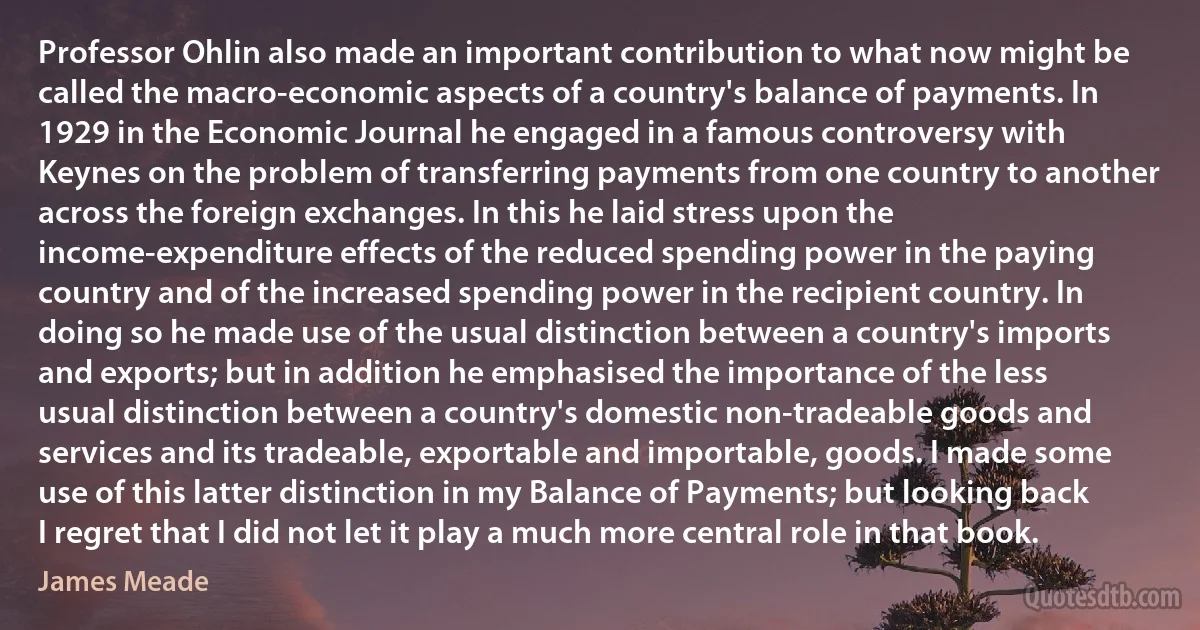
Professor Ohlin also made an important contribution to what now might be called the macro-economic aspects of a country's balance of payments. In 1929 in the Economic Journal he engaged in a famous controversy with Keynes on the problem of transferring payments from one country to another across the foreign exchanges. In this he laid stress upon the income-expenditure effects of the reduced spending power in the paying country and of the increased spending power in the recipient country. In doing so he made use of the usual distinction between a country's imports and exports; but in addition he emphasised the importance of the less usual distinction between a country's domestic non-tradeable goods and services and its tradeable, exportable and importable, goods. I made some use of this latter distinction in my Balance of Payments; but looking back I regret that I did not let it play a much more central role in that book.
James MeadeRelated topics
across book central controversy country foreign goods journal lay less looking might now play power problem recipient regret spending stress transferring use keynesRelated quotes
The main burden of local defense against local attack, subversion, insurrection or guerrilla warfare must of necessity rest with local forces. Where these forces have the necessary will and capacity to cope with such threats, our intervention is rarely necessary or helpful. Where the will is present and only capacity is lacking, our Military Assistance Program can be of help. But this program, like economic assistance, needs a new emphasis. It cannot be extended without regard to the social, political and military reforms essential to internal respect and stability. The equipment and training provided must be tailored to legitimate local needs and to our own foreign and military policies, not to our supply of military stocks or a local leader's desire for military display. And military assistance can, in addition to its military purposes, make a contribution to economic progress, as do our own Army Engineers.

John F. Kennedy
What, then, is the animal? First of all, a system of plant-souls. The unity of those plant-souls, which unity nature itself produces, is the soul of the animal. Its world is therefore partly that of the plants - its nourishment, for instance, it receives partly through synthesis from vegetable, and through analysis from animal nature - and partly that of the animals, whereof we shall speak directly. Each product of nature is an organically in-itself completed totality in space, like the plant. Hence, the unknown x which we are looking for must also be such a whole or totality, and in so far it must also have a principle of organization, a sphere and central point of this organization; in short, the same which we have called the soul of the plant, which thus remains common to both. ... The animal is a system of plant-souls, and the plant is a separated, isolated part of an animal. Both reciprocally affect each other.

Johann Gottlieb Fichte
I would summarize the Keynesian view in terms of four points:1. Economies sometimes produce much less than they could, and employ many fewer workers than they should, because there just isn't enough spending. Such episodes can happen for a variety of reasons; the question is how to respond.
2. There are normally forces that tend to push the economy back toward full employment. But they work slowly; a hands-off policy toward depressed economies means accepting a long, unnecessary period of pain.
3. It is often possible to drastically shorten this period of pain and greatly reduce the human and financial losses by "printing money”, using the central bank's power of currency creation to push interest rates down.
4. Sometimes, however, monetary policy loses its effectiveness, especially when rates are close to zero. In that case temporary deficit spending can provide a useful boost. And conversely, fiscal austerity in a depressed economy imposes large economic losses.

Paul Krugman
The unremitting division of labour resulted in admirable levels of productivity. The company's success appeared to bear out the principles of efficiency laid down at the turn of the twentieth century by the Italian economist Vilfredo Pareto, who theorized that a society would grow wealthy to the extent that its members forfeited general knowledge in favour of fostering individual ability in narrowly constricted fields. In an ideal Paretan economy, jobs would be ever more finely subdivided to allow for the accumulation of complex skills, which would then be traded among workers. ... But however great the economic advantages of segmenting the elements of an afternoon's work into a range of forty-year-long careers, there was reason to wonder about the unintended side effects of doing so. In particular, one felt tempted to ask ... how meaningful the lives might feel as a result.

Alain de Botton
In this world, as in our own, nearly all the chief means of production, nearly all the land, mines, factories, railways, ships, were controlled for private profit by a small minority of the population. These privileged individuals were able to force the masses to work for them on pain of starvation. The tragic farce inherent in such a system was already approaching. The owners directed the energy of the workers increasingly toward the production of more means of production rather than to the fulfilment of the needs of individual life. For machinery might bring profit to the owners; bread would not. With the increasing competition of machine with machine, profits declined, and therefore wages, and therefore effective demand for goods. Marketless products were destroyed, though bellies were unfed and backs unclad. Unemployment, disorder, and stern repression increased as the economic system disintegrated. A familiar story!

Olaf Stapledon
